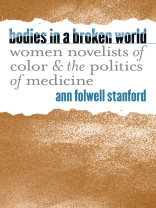In this multidisciplinary study, Ann Folwell Stanford reads literature written by U.S. women of color to propose a rethinking of modern medical practice, arguing that personal health and social justice are inextricably linked. Drawing on feminist ethics to explore the work of eleven novelists, Stanford challenges medicine to position itself more deeply within the communities it serves, especially the poor and marginalized. However, she also argues that medicine must recognize its limits and join forces with the nonmedical community in the struggle for social justice.
In literary representations of physical and emotional states of illness and health, Stanford identifies issues related to public health, medical ethics, institutionalized racism, women’s health, domestic abuse, and social justice that are important to discussions about how to improve health and health care. She argues that in either direct or indirect ways, the eleven novelists considered here push us to see health not only as an individual condition but also as a complex network of individual, institutional, and social changes in which wellness can be a possibility for the majority rather than a privileged few.
The novelists whose works are discussed are Toni Cade Bambara, Paule Marshall, Gloria Naylor, Leslie Marmon Silko, Toni Morrison, Louise Erdrich, Sandra Cisneros, Bebe Moore Campbell, Sapphire, Ana Castillo, and Octavia Butler.
A propos de l’auteur
Ann Folwell Stanford is professor of multidisciplinary and literary studies at the School for New Learning at De Paul University in Chicago.












